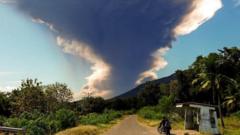In response to a substantial increase in migrant numbers, Greece has decided to suspend the processing of asylum applications from North Africa for three months. Conservative Prime Minister Kyriakos Mitsotakis announced that individuals arriving by boat from the region would face arrest and detention. He emphasized that Greece aims to send a clear message of determination against human traffickers, stating that the money migrants invest in such endeavors could ultimately be wasted due to increased barriers to reaching Greece.
Greece Halts Asylum Applications Amid Migrant Surge from North Africa

Greece Halts Asylum Applications Amid Migrant Surge from North Africa
Greece's recent measure to suspend asylum applications reflects an alarming rise in migrant arrivals from North Africa, especially to Crete and Gavdos.
The announcement comes as Greece has seen a dramatic 350% rise in migrant arrivals compared to the previous year, with more than 2,000 landing on Crete and another 520 rescued off the coast recently. The total figure since the beginning of 2023 has reached around 9,000. Vasilis Katsikandarakis, president of the Western Crete Coast Guard Personnel Association, expressed that the immigration situation is overwhelming local authorities, who are struggling to cope with the influx.
Government spokesman Pavlos Marinakis echoed this sentiment, noting that the flow of migrants is "growing and ongoing." As local accommodations are overwhelmed, numerous migrants are currently housed in a market hall under challenging conditions, including many families with young children.
The logistics of redistributing migrants have been hampered by the tourist season, which has limited transportation options. Furthermore, discussions involving Greek, Italian, and Maltese officials with Libyan authorities about the ongoing crisis were disrupted when the Libyan Government of National Stability refused their entry, citing a violation of sovereignty.
Mitsotakis remarked that Greece's military would be willing to assist Libyan authorities in curbing departures from the Libyan shoreline. However, this collaboration has faced criticism from NGOs, which have highlighted the inhumane conditions in Libyan detention camps for migrants intercepted at sea. Amnesty International has voiced concerns over European countries prioritizing deterrents while neglecting the dignity and safety of migrants and refugees.
Government spokesman Pavlos Marinakis echoed this sentiment, noting that the flow of migrants is "growing and ongoing." As local accommodations are overwhelmed, numerous migrants are currently housed in a market hall under challenging conditions, including many families with young children.
The logistics of redistributing migrants have been hampered by the tourist season, which has limited transportation options. Furthermore, discussions involving Greek, Italian, and Maltese officials with Libyan authorities about the ongoing crisis were disrupted when the Libyan Government of National Stability refused their entry, citing a violation of sovereignty.
Mitsotakis remarked that Greece's military would be willing to assist Libyan authorities in curbing departures from the Libyan shoreline. However, this collaboration has faced criticism from NGOs, which have highlighted the inhumane conditions in Libyan detention camps for migrants intercepted at sea. Amnesty International has voiced concerns over European countries prioritizing deterrents while neglecting the dignity and safety of migrants and refugees.



















